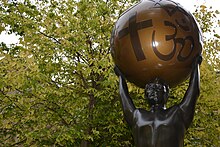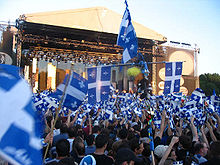Canadian values
[9][10] In Canada the idea of a "just society" is constitutionally protected,[11] with government policies—such as publicly funded health care; higher and more progressive taxation; outlawing capital punishment; strong efforts to eliminate poverty; an emphasis on cultural diversity; the legalization of same-sex marriage, pregnancy terminations, and euthanasia—being social indicators of the country's political and cultural values.
[19][4] Despite Canadians progressive views, ongoing societal challenges exist, including what has variously been described as neglect, indifference and human rights violations of marginalized groups; such as the treatment of Indigenous peoples, profiling of visible minority, poverty faced by those with disabilities, concerns with the treatment of migrants and refugees and the freedom of religion and language expression in Quebec society.
[23] With the exception of linguistic duality where there was no gender differences larger share of women agreed to a great extent with social and democratic values when compared with men.
[23] Geographically, significant differences exist with respect to the values of gender equality and having English and French as Canada’s official languages.
[23] According to the 2020 Angus Reid Institute survey, Canadians exhibit a variety of perspectives on social issues, demonstrating both consensus and discord on numerous subjects.
Conversely, the discourse surrounding abortion rights continues to be contentious, especially concerning third-trimester procedures, where opinions are evenly divided on the necessity for legislation.
[2] The intersection of religion and public life elicits mixed reactions; while a significant portion of the population prefers a secular framework, a substantial minority desires a more overt acknowledgment of faith's influence.
Though Canada has a history of embracing multiculturalism, recent patterns indicate increased support for prompting newcomers to assimilate into mainstream society, with 68% of respondents previously endorsing this perspective.
Comparable divisions arise in the discussion surrounding the increased representation of women in top management roles, where responses are closely split.
[2] Canadians find commonality on certain matters like assisted dying and LGBTQ rights, while persisting in polarized opinions regarding abortion, economic policies, and the influence of religion in public affairs.
These included: individualism and competitiveness, entrepreneurship and high risk-taking, Utopian moralism, inclination to political crusades, populist or anti-establishment and anti-elite tendencies, a God-and-country nationalism, and intolerance for ideological nonconformity.
[32] Justin Trudeau after taking office as Prime Minister in 2015 tried to define what it means to be Canadian, saying that Canada lacks a core identity but does have shared values:[33] Some critics observe that Trudeau's list of values are an evolving one as political circumstances arise, and the idea of post-nationalism by stripping Canada's European History is a pavement to tribalism and race based politics to cement stakeholder groups and appeal to them during elections.
He stated: Hoover and Reimer agree and update Lipset with a plethora of recent survey statistics, while noting that the differences narrowed since 1990, especially in the Prairie provinces.
[49] Contrasted to the United States, historical educational ideals in Canada have been more elitist, with an emphasis on training church and political elites along British lines.
"[57] Survey research in the 1990s showed that: The Canadian Charter of Rights and Freedoms, heavily promoted by Prime Minister Pierre Trudeau, was adopted in 1982.
Griffith adds that "There are virtually no differences between Canadian-born and foreign-born individuals when it comes to their agreement to abide by Canadian values (70 and 68 percent, respectively).
[67] However, women from England and Scotland faced fewer restrictions, as they were considered 'good stock' who could potentially marry white Canadian men.
[68] In a 1947 speech, Liberal Prime Minister Mackenzie King strongly advocated for restrictions on immigration from Asian countries in order to preserve the characteristics of the population and prevent interracial marriages.
This racially discriminatory law ranked people from different parts of the world hierarchically, reflecting the legacy of settler-colonization in the country.
[69] This law underwent significant changes in 1962 under Conservative Prime Minister John Diefenbaker, shifting its focus to economic interests and introducing universal criteria for admission.
However, in 1987, the now-disbanded Reform Party of Canada attempted to revive Prime Minister King's perspective of maintaining the ethnic makeup of the country.
The 1993 federal election saw a lack of consensus regarding multiculturalism policy and its symbolism, which continues into the contemporary decade with the enduring popular assumption that 'real' Canadians are white and originally of European descent.
"[86] The Institute for Canadian Values sponsored advertisements against the teaching of certain sexual education topics in the Ontario school curriculum and discriminated against transsexual, transgender, and intersex persons.
The Conservatives expanded the issue, announcing a proposed RCMP hotline that would allow Canadians to report the existence of 'barbaric cultural practices' in the country."
He contends that: Stairs also argues that, "first billing is usually given in received lists of Canadian values to 'multiculturalism'... as a means of challenging the premises of nationalism in Quebec.
"[97][98] Indigenous women and girls in Canada are at high risk of kidnapping and murder,[99] prompting a National Inquiry from 2016 to 2019 that described the situation as a "race, identity and gender-based genocide. "
[102] In Canada, individuals with disabilities face both historical and current discrimination, resulting in lower education, higher unemployment, and inadequate income.
[109] Bill 21, enacted in 2019, bans religious symbols for public employees, raising human rights issues, particularly for Muslim women.











